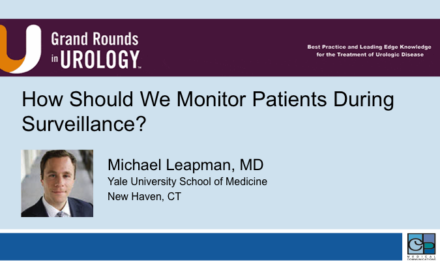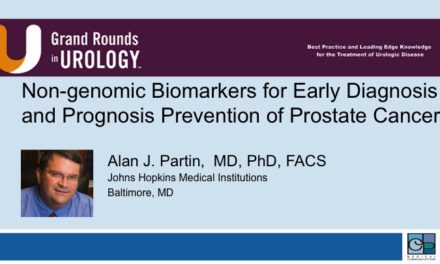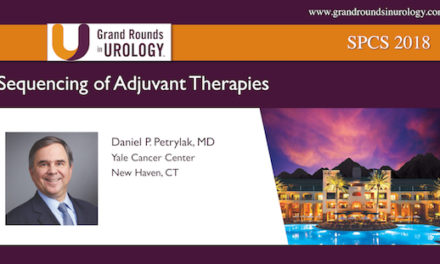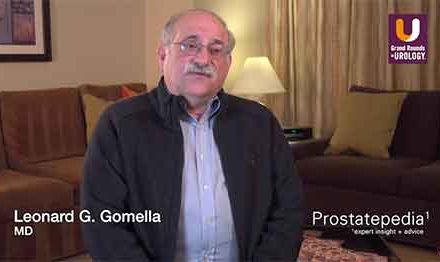Dr. Leonard G. Gomella spoke at the 24th International Prostate Cancer Update on Thursday, February 20, 2014 on “Testosterone Replacement in the Prostate Cancer Patient.” In his presentation, Dr. Gomella discusses recent clinical studies showing correlations between testosterone levels and prostate cancer and men receiving exogenous testosterone.
Presentation
Keywords: testosterone replacement therapy, hypogonadal, prostate cancer, testosterone level
How to cite: Gomella, Leonard G. “Testosterone Replacement in the Prostate Cancer Patient.” Grand Rounds in Urology. January 12, 2015. Accessed Dec 2024. https://dev.grandroundsinurology.com/prostate-cancer-leonard-g-gomella-testosterone-replacement/.
References
Agarwal PK, Oefelein MG. Testosterone replacement therapy after primary treatment for prostate cancer. J Urol. 2005 Feb;173(2):533-6. http://www.ncbi.nlm.nih.gov/pubmed/15643240
Basaria S, Coviello AD, Travison TG, et al. Adverse events associated with testosterone administration. N Engl J Med. 2010 Jul 8;363(2):109-22. http://www.ncbi.nlm.nih.gov/pubmed/20592293
Bhasin S, Cunningham GR, Hayes FJ, et al. Testosterone therapy in adult men with androgen deficiency syndromes: an endocrine society clinical practice guideline. J Clin Endocrinol Metab. 2006 Jun;91(6):1995-2010 http://www.ncbi.nlm.nih.gov/pubmed/16720669
Carroll P, Coley C, McLeod D, et al. Prostate-specific antigen best practice policy–part I: early detection and diagnosis of prostate cancer. Urology. 2001 Feb;57(2):217-24. http://www.ncbi.nlm.nih.gov/pubmed/11182324
Conners WP 3rd, Morgentaler A. The evaluation and management of testosterone deficiency: the new frontier in urology and men’s health. Curr Urol Rep. 2013 Dec;14(6):557-64. http://www.ncbi.nlm.nih.gov/pubmed/23999611
Dandona P, Rosenberg MT. A practical guide to male hypogonadism in the primary care setting. Int J Clin Pract. 2010 May;64(6):682-96. http://www.ncbi.nlm.nih.gov/pubmed/20518947
English KM, Steeds RP, Jones TH, et al. Low-dose transdermal testosterone therapy improves angina threshold in men with chronic stable angina: A randomized, double-blind, placebo-controlled study. Circulation. 2000 Oct 17;102(16):1906-11. http://www.ncbi.nlm.nih.gov/pubmed/11034937
English KM, Mandour O, Steeds RP, et al. Men with coronary artery disease have lower levels of androgens than men with normal coronary angiograms. Eur Heart J. 2000 Jun;21(11):890-4. http://www.ncbi.nlm.nih.gov/pubmed/10806012
Finkle WD, Greenland S, Ridgeway GK, et al. Increased risk of non-fatal myocardial infarction following testosterone therapy prescription in men. PLoS One. 2014 Jan 29;9(1):e85805. http://www.ncbi.nlm.nih.gov/pubmed/24489673
Gooren LJ, Behre HM, Saad F, et al. Diagnosing and treating testosterone deficiency in different parts of the world. Results from global market research. Aging Male. 2007 Dec;10(4):173-81 http://www.ncbi.nlm.nih.gov/pubmed/18033626
Haddad RM, Kennedy CC, Caples SM, et al. Testosterone and cardiovascular risk in men: a systematic review and meta-analysis of randomized placebo-controlled trials. Mayo Clin Proc. 2007 Jan;82(1):29-39 http://www.ncbi.nlm.nih.gov/pubmed/17285783
Hak AE, Witteman JC, de Jong FH, et al. Low levels of endogenous androgens increase the risk of atherosclerosis in elderly men: the Rotterdam study. J Clin Endocrinol Metab. 2002 Aug;87(8):3632-9. http://www.ncbi.nlm.nih.gov/pubmed/12161487
Hijazi RA, Cunningham GR. Andropause: is androgen replacement therapy indicated for the aging male? Annu Rev Med. 2005;56:117-37. http://www.ncbi.nlm.nih.gov/pubmed/15660505
Jannini EA, Gravina GL, Morgentaler A, et al. Is testosterone a friend or a foe of the prostate? J Sex Med. 2011 Apr;8(4):946-55. http://www.ncbi.nlm.nih.gov/pubmed/21457469
Kaplan AL, Hu JC. Use of testosterone replacement therapy in the United States and its effect on subsequent prostate cancer outcomes. Urology. 2013 Aug;82(2):321-6. http://www.ncbi.nlm.nih.gov/pubmed/23706552
Khera M, Crawford D, Morales A, et al. A new era of testosterone and prostate cancer: from physiology to clinical implications. Eur Urol. 2014 Jan;65(1):115-23. http://www.ncbi.nlm.nih.gov/pubmed/24011426
Khera M, Grober ED, Najari B, et al. Testosterone replacement therapy following radical prostatectomy. J Sex Med. 2009 Apr;6(4):1165-70. http://www.ncbi.nlm.nih.gov/pubmed/19207277
Maggi M, Schulman C, Quinton R, et al. The burden of testosterone deficiency syndrome in adult men: economic and quality-of-life impact. J Sex Med. 2007 Jul;4(4 Pt 1):1056-69. http://www.ncbi.nlm.nih.gov/pubmed/17627750
McNicholas TA, Dean JD, Mulder H, et al. A novel testosterone gel formulation normalizes androgen levels in hypogonadal men, with improvements in body composition and sexual function. BJU Int. 2003 Jan;91(1):69-74. http://www.ncbi.nlm.nih.gov/pubmed/12614254
Miner MM, Sadovsky R. Evolving issues in male hypogonadism: evaluation, management, and related comorbidities. Cleve Clin J Med. 2007 May;74 Suppl 3:S38-46. http://www.ncbi.nlm.nih.gov/pubmed/17549824
Morgentaler A, Bruning CO 3rd, DeWolf WC. Occult prostate cancer in men with low serum testosterone levels. JAMA. 1996 Dec 18;276(23):1904-6. http://www.ncbi.nlm.nih.gov/pubmed/8968017
Mulligan T, Frick MF, Zuraw QC, et al. Prevalence of hypogonadism in males aged at least 45 years: the HIM study. Int J Clin Pract. 2006 Jul;60(7):762-9. http://www.ncbi.nlm.nih.gov/pubmed/16846397
Muraleedharan V, Marsh H, Kapoor D, et al. Testosterone deficiency is associated with increased risk of mortality and testosterone replacement improves survival in men with type 2 diabetes. Eur J Endocrinol. 2013 Oct 21;169(6):725-33. http://www.ncbi.nlm.nih.gov/pubmed/23999642
Raynaud JP. Prostate cancer risk in testosterone-treated men. J Steroid Biochem Mol Biol. 2006 Dec;102(1-5):261-6. http://www.ncbi.nlm.nih.gov/pubmed/17113983
Rhoden EL, Morgentaler A. Risks of testosterone-replacement therapy and recommendations for monitoring. N Engl J Med. 2004 Jan 29;350(5):482-92. http://www.ncbi.nlm.nih.gov/pubmed/14749457
Shelton JB, Rajfer J. Androgen deficiency in aging and metabolically challenged men. Urol Clin North Am. 2012 Feb;39(1):63-75. http://www.ncbi.nlm.nih.gov/pubmed/22118346
Shores MM, Matsumoto AM, Sloan KL, et al. Low serum testosterone and mortality in male veterans. Arch Intern Med. 2006 Aug 14-28;166(15):1660-5. http://www.ncbi.nlm.nih.gov/pubmed/16908801
Shores MM, Smith NL, Forsberg CW, et al. Testosterone treatment and mortality in men with low testosterone levels. J Clin Endocrinol Metab. 2012 Jun;97(6):2050-8. http://www.ncbi.nlm.nih.gov/pubmed/22496507
Vigen R, O’Donnell CI, Barón AE, et al. Association of testosterone therapy with mortality, myocardial infarction, and stroke in men with lowtestosterone levels. JAMA. 2013 Nov 6;310(17):1829-36. http://www.ncbi.nlm.nih.gov/pubmed/24193080
Wang C, Nieschlag E, Swerdloff R, et al. Investigation, treatment, and monitoring of late-onset hypogonadism in males: ISA, ISSAM, EAU, EAA, and ASA recommendations. J Androl. 2009 Jan-Feb;30(1):1-9. http://www.ncbi.nlm.nih.gov/pubmed/18772485
Webb CM, McNeill JG, Hayward CS, et al. Effects of testosterone on coronary vasomotor regulation in men with coronary heart disease. Circulation. 1999 Oct 19;100(16):1690-6. http://www.ncbi.nlm.nih.gov/pubmed/10525487
Yeap BB, Alfonso H, Chubb SA, et al. In older men an optimal plasma testosterone is associated with reduced all-cause mortality and higher dihydrotestosterone with reduced ischemic heart disease mortality, while estradiol levels do not predict mortality. J Clin Endocrinol Metab. 2014 Jan;99(1):E9-18. http://www.ncbi.nlm.nih.gov/pubmed/24257908
ABOUT THE AUTHOR
Leonard Gomella, MD, FACS, is the Bernard W. Godwin, Jr., Professor of Prostate Cancer and Chairman of the Department of Urology at the Sidney Kimmel Medical College of Thomas Jefferson University. He joined the Jefferson faculty in 1988 and was appointed Chair in 2002. He serves as Senior Director for Clinical Affairs for the NCI-designated Sidney Kimmel Cancer Center, Clinical Director of the SKCC Network, and Urology Chair for NRG (RTOG). Dr. Gomella is involved in translational basic science and clinical research in the development of new diagnostic techniques and treatments for prostate and bladder cancer through the Sidney Kimmel Cancer Center as Co-Leader of the Biology of Prostate Cancer Program. In 1992, he led the team that first used molecular techniques to detect circulating tumor cells in prostate cancer. He has given over 500 presentations, written over 400 papers, and edited dozens of chapters and monographs in the field of urology. Dr. Gomella has authored and edited many editions of a number of books for medical students, residents, and practicing physicians, including the “Clinician’s Pocket Reference” (aka “The Scut Monkey Book”) and “Five Minute Urology Consult.” He is also Editor-in-Chief of the Canadian Journal of Urology. “Recovering from Prostate Cancer,” which Dr. Gomella wrote in 1993, was the first book released for the general public specifically on the topic of prostate cancer.
“Best Doctors in America,” “Top Doctors for Cancer,” and Philadelphia Magazine’s “Top Doctors” have recognized him for many years for his contributions to urologic oncology and prostate cancer care. He also received national recognition in Newsweek in 2015. In 2007, Men’s Health listed Dr. Gomella as one of the 20 top urologists in the US. He has received numerous awards, including the American Cancer Society’s “Volunteer Achievement Award” and an “NCI Achievement Award.” He has been President of the Mid-Atlantic Section of the AUA and has been elected to the American Association of Genitourinary Surgeons and the prestigious Clinical Society of Genitourinary Surgeons. The University of Kentucky College of Medicine awarded him a “Distinguished Alumnus Award” in 2009. From 2015-2017, he was President of the Society of Urologic Oncology. In 2015, he received a “Distinguished Contribution Award” from the AUA and Jefferson honored him with the “Jefferson Achievement Award in Medicine.”





